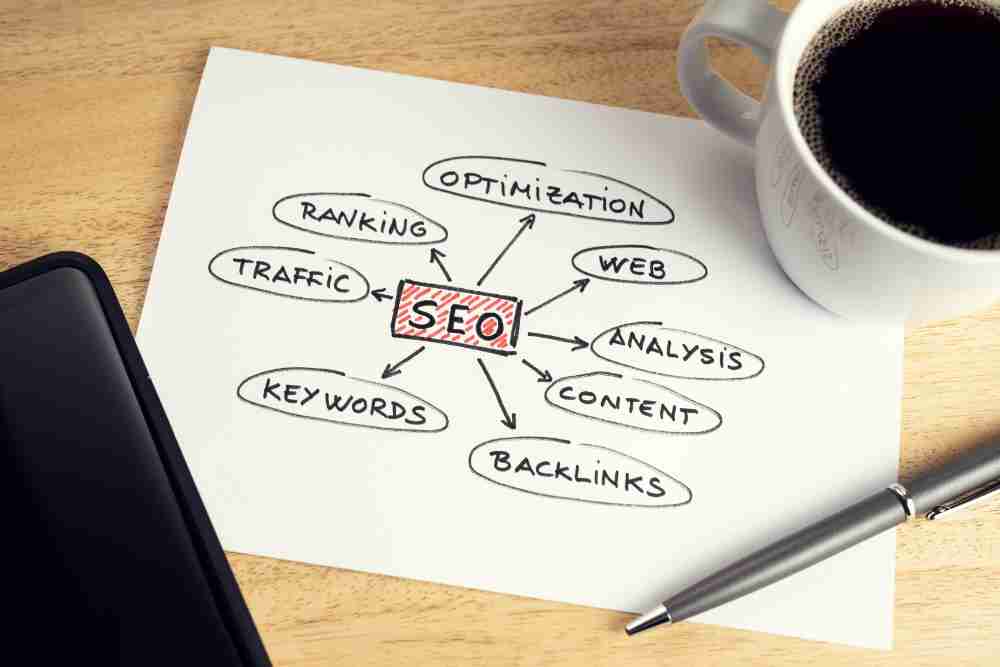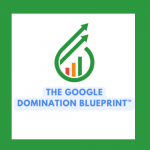SEO For Therapists
SEO for Therapists (Search Engine Optimisation) is how to attract visitors and potential clients to your website without paying for expensive adverts. Having a basic knowledge of SEO can help to get free and well-targeted visitors to your site with an interest in buying your services.
I know from first-hand experience that SEO sounds like hard work and that most people just want to get on with helping their clients. From helping other therapists, even some basic knowledge of SEO can make a big difference in attracting the right clients to your practice. The single biggest complaint that Jonathan and I hear is the difficulty hypnotherapists and therapists have getting a steady stream of prospective clients.
Table of Contents

- What is SEO
- The benefits of SEO
- How Does SEO Work?
- On-Page SEO
- Off-Page SEO
- Technical SEO
- Conclusion
Several factors determine a website’s ranking. Understanding these factors and how to optimise for them is a really useful skill for therapists looking to improve their website’s visibility and drive more traffic.
What is SEO?
Put yourself in your client’s shoes. You have a personal challenge and need some expert help. Most likely, you will go to Google to look up your options.
If you are looking for a hypnotherapist close by, you might search for “Hypnotherapy Stratford upon Avon”. Here are some typical results.


Google tries to find the websites it thinks are the best results for your search.
In this case, it has found 3 hypnotherapists who are based in Stratford Upon Avon. This makes it easy to decide who is worth looking at without spending lots of time looking around various sites and clicking on the results.
Getting visitors to your website is what SEO is all about. You have to get in the top 3 to get a decent amount of leads for your business. If you are on the second page, you probably won’t have enough visitors to make your business viable.
Here is a breakdown of what Google returns for this search. There are three types of results shown in the screenshot:

This block displayed at the top is for adverts. A hypnotherapist or a big organisation like Yell has paid for their advert to be shown when someone searches for your search. You might think that being shown first gets the best results. But, it doesn’t. We have all grown very wary of adverts and many studies have shown that we have learnt to ignore and skip these when searching. They don’t get as many clicks as the next block.

This is known as the “Local Listing” These are the sites that Google thinks are local to your search and most appropriate. These three tend to get the lion’s share of the clicks. You must show up in this block to get a steady stream of potential clients for your business. These sites have all been registered with the Google My Business service, sometimes called GMB or Google Business Profile. Google does change the name of this service periodically but is essentially the same thing.
There is also another list of potentially useful sites which shows up slightly further down:

These are called the “Organic Results”. Google has evaluated these sites and determined they are the best outside of its GMB service. This listing is often the best for hypnotherapists who don’t just operate locally but may look after clients from their whole region or around the world. Ideally, you want to rank top in both listings. I have noticed that organic listings can be more stable than the GMB listing and your site can sometimes wander up and down as Google refines its search results. Therefore being in both is essential to get a steady stream of leads.
SEO consists of 3 main elements, on-page optimisation, off-page optimisation, and technical SEO. Although these sound intimidating, they are fairly simple to understand:
- On-page optimisation involves optimizing the content and structure of your website to make it more search-engine friendly helping Google and other search engines such as Bing to understand what your page and site are about. This is done by tuning your website addresses, meta tags, content headings, and the text of the page.
- Off-page optimization involves other reputable websites linking to yours to improve your authority and reputation.
- Technical SEO involves optimizing the website’s technical aspects, such as site speed, mobile-friendliness, and security.
SEO’s goal is to increase the quantity and quality of traffic to your website through organic search engine results. Organic traffic refers to traffic coming from free search results, as opposed to paid search results, which are generated through paid advertising. By optimising their website for search engines, Therapists can increase their visibility online, attract more potential customers, and ultimately increase their revenue.
Pro Tip: Choosing the right keywords will get you far more traffic
Ironically, optimising your website for hypnotherapist + your location is actually a poor choice and its what most therapists will do. The problem is that this assumes that the people who you can really help actually know what hypnotherapy is and are actively searching for this.
In marketing there is a saying that pain sells. Nothing to do with sadism and masochism, but when you are trying to fix something unpleasant and painful, you are in a hurry and are far more likely to spend money!. Its better to focus on these problems and your ability to help. If you specialise in particular challenges even better as your visitor is more likely to relate to you as you understand them!
Why is SEO Important?
SEO plays a crucial role in digital marketing and is essential for businesses of all sizes. Here are some reasons why SEO is important:
- Increased visibility: SEO helps your website rank higher in search engine results pages (SERPs) and increases your online visibility. Yyour potential customers are more likely to find your website when they search for relevant keywords or phrases.
- More traffic: By ranking higher in SERPs, you can attract more organic traffic to your website. This means that more people are visiting your site, which can lead to more leads, conversions, and sales.
- Improved user experience: SEO is not just about ranking higher in search results. It also involves improving the user experience on your website by making it faster, more accessible, and easier to navigate. This can help increase engagement and reduce so-called bounce rates. This is where a visitor only visits one page and is never seen again!
- Cost-effective: SEO is a cost-effective way to drive traffic to your website. Unlike paid advertising, you do not have to pay for each click or impression. Once you have optimized your website for SEO, you can continue to benefit from increased traffic and visibility without additional costs.
Overall, SEO is an essential aspect of digital marketing that can help businesses of all sizes increase their online visibility, attract more traffic, and improve the user experience on their website. By investing in SEO, Therapists can achieve long-term success and stay ahead of their competition.
How Does SEO Work?
The goal is to increase the quantity and quality of organic traffic to your website from search engines like Google, Bing, and Yahoo. Although Google is the largest traffic source, other search engines can also provide useful visitors.
Search engines use complex algorithms to determine which websites to display in their results. These algorithms take into account a variety of factors, including the relevance and quality of the content on your website, the number and quality of other websites linking to your website, and the structure and organization of your website.
To improve your website’s ranking in the search engine results pages, you need to optimise your website for the factors that search engines consider important. This involves a variety of techniques, including:
- Keyword research: Identifying the keywords and phrases your audience is searching for and incorporating them into your website’s content. Selecting the right keywords is critical. You must be sure that someone is searching for these words and that there aren’t hundreds of other sites also targeting the same words. There is a sweet spot with just enough traffic and not too much competition.
- On-page optimisation: Optimise your website’s content, structure, and HTML code to make it easier for search engines to understand and index your website. Also, it needs to ensure that the search engines know the particular keyword associated with each page.
- Link building: Google measures your site’s authority by the quality of the other sites that link to you. For a local business, you only need a handful of these links.
- Technical SEO: Ensuring your website is technically sound, loads quickly and is free of errors. Google uses these factors to decide where it will display your website in its listings. Slow sites in particular get penalised and get less traffic as a result.
- Google Reviews: Strong customer reviews show that your business is popular and provides good service. This has become one of Google’s top measures for local results.
Although getting traffic through SEO avoids advertising costs, it is an ongoing process that requires regular monitoring and adjustment. It can take time to see the results of your efforts, a well-executed SEO strategy can have a significant impact on your website’s traffic and visibility in search engine results pages.
Although SEO sounds very technical, it involves a handful of ideas. Once set up, checking your results monthly and adjusting is all that is needed.
Key Tip
Don’t sell the same services as every other therapist in your area. When you do this, as there is so much choice, client’s end up going for the cheapest rather than the best. Our course goes through this in great detail about positioning your self as the ideal therapist for your cient and helping you to command the price that you deserve.
On-Page SEO
On-Page SEO refers to the optimisation of individual web pages to rank higher and earn more relevant traffic in search engines. It involves optimising both the content and source code of a page. Almost all of this can be done simply using an SEO Plugin or your website hosting software. Here are some key factors to consider
Title Tags
Title tags are one of the most important on-page ranking factors. They are displayed as clickable headlines in search engine results pages (SERPs) and should accurately describe the page’s content. Title tags should be concise, and unique, and include the target keyword for the page.

The Title tag and the meta descriptions set what is shown in the results so it’s important to get these right. This directly affects whether a searcher will click through to your website. If you don’t set these Google and the other search engines will guess and frequently get it wrong!
Meta Descriptions
Meta descriptions are brief summaries of the content of a page that appear in the results beneath the title tag. They should be compelling and accurately describe the page content which also include the target keyword. Although meta descriptions are not a direct ranking factor, they can impact click-through rates and indirectly affect rankings.
Google also tracks how often people click on the listing for your site. If this is low then it tends to relegate your site, so this wording really matters. It is your shop window!
Header Tags
Header tags (H1, H2, H3, etc.) help to structure the content of a page and make it easier to read for both users and search engines. The H1 tag should be used for the main headline of the page, while H2 tags should be used for subheadings. Including target keywords in header tags can also help to signal to search engines what the page is about. The H1 tag should include your in a way that makes sense for the reader and not just for Google.
Keyword Research
Keyword research is the process of identifying the phrases and terms that users are searching for related to your business or industry. This information can then be used to optimize on-page content and target specific keywords that are relevant to your business. Keyword research can also help to identify gaps in your content and provide ideas for new content topics.
Content Optimisation
Optimising on-page content involves ensuring that it is high-quality, relevant, and provides value to users. Content should be written with the target audience in mind and should use target keywords naturally throughout the page. Including images, videos, and other multimedia can also help to improve the user experience and engagement with the page.
6. Off-Page SEO
Off-Page SEO refers to the activities you perform outside of your website to improve its search engine rankings. It includes link building, social media marketing, guest blogging, and other techniques that help you build your website’s authority and reputation.
Link Building
Link building is one of the most important off-page SEO techniques. It involves getting other websites to link to your site, which can help improve your search engine rankings. When other websites link to your site, it signals to search engines that your site is a valuable resource that others find helpful. However, it’s important to note that not all links are created equal. Links from high-authority websites are more valuable than links from low-quality sites.
One way to build links is to create high-quality content that others will want to link to. You can also reach out to other website owners and ask them to link to your site. However, it’s important to do this in a way that is respectful and not spammy.
Social Media Marketing
Social media marketing involves using social media platforms like Facebook, Twitter, and Instagram to promote your website and its content. By sharing your content on social media, you can increase its visibility and reach a wider audience. You can also use social media to engage with your audience and build relationships with other users in your industry.
One important thing to keep in mind when using social media for SEO is that social signals (likes, shares, etc.) are not direct ranking factors. However, social media can indirectly impact your search engine rankings by increasing your website’s visibility and driving traffic to your site. If Google sees lots of interest in your social media pages, it again signals that your content is useful or popular.
Many therapists who spent considerable time posting to social media have reported very disappointing results. There are many challenges which make it difficult to pick up clients. Typically, if you are searching for a service, you would Google this first. Social media tends to be used less for marketing than keeping in touch and following people you know. There are therapists who have successfully used social media for marketing, but they tend to have existing, established audiences or are selling something very niche.
It is worth having a presence on social media, just to make it easier for clients to get in touch. However, it should not be your main marketing route.
7. Technical SEO
Technical SEO is the process of optimising a website for search engines, but it can also include activities meant to improve user experience. Technical SEO is crucial for ensuring that search engines can understand and rank your website effectively.
Site Speed
Site speed is a crucial factor in technical SEO. A slow-loading website can negatively impact user experience and lead to high bounce rates(This is where people only visit your home page and then don’t go anywhere else). In addition, Google has indicated that site speed is a ranking factor in its algorithm. To improve your site speed, consider compressing images, minifying code, and leveraging browser caching(We discuss these topics elsewhere and in our course).
Mobile-Friendliness
Mobile-friendliness is another important factor in technical SEO. Most searches are now from mobile phones, it’s really important that your content is built with this in mind. Google has also indicated that mobile-friendliness is a ranking factor in its algorithm. To ensure your website is mobile-friendly, consider using checking your site on a mobile phone and tablet. Your website theme MUST be designed for mobiles. Small picture sizes are also important and download times can be slow if you have a poor signal. Research has shown that if a site takes over 5 seconds to leave, a lot of visitors will simply go to the next site.
Crawlability
Crawlability refers to how easily search engines can crawl and index your website. To ensure your website is crawlable, make sure your website is well-organized and that your website has a sitemap. In addition, check that your website’s URLs are descriptive and easy to understand.
Measuring Your Success
Measuring the success of your SEO strategy is essential to check that your efforts are paying off. Here are some ways to measure the success of your SEO strategy:
Google Analytics
Google Analytics is a free tool that helps you track your website’s traffic and user behaviour. It provides you with valuable insights into how people are finding and using your website. You can use Google Analytics to track organic traffic, bounce rates, time spent on site, and more. By monitoring these metrics, you can determine whether your SEO strategy is driving the right kind of traffic to your site.

Ranking Reports
Ranking reports help you track your website’s search engine rankings for specific keywords. By monitoring your rankings, you can determine whether your SEO strategy is improving your website’s visibility in search engine results. Keep in mind that rankings are not the only metric that matters. It’s important to focus on driving relevant traffic to your site, rather than just improving your rankings.

Overall, measuring the success of your SEO strategy is crucial to ensuring that your efforts are paying off. By using tools like Google Analytics and ranking reports, you can gain valuable insights into how people are finding and using your website, and adjust your strategy accordingly.
Conclusion
SEO is an essential part of any therapist’s marketing. It is the process of getting quality visitors by optimising your website improving its visibility and ranking in the search engine results. By improving your SEO, you can increase your online presence, attract more traffic, and ultimately generate more leads and sales.
One of the key benefits of SEO is that it is a cost-effective way to market a business. Unlike traditional advertising methods, which can be expensive and have limited reach, SEO allows you to reach a wider audience without breaking the bank. By targeting specific keywords and phrases, it can attract users who are actively searching for your products or services.
Another advantage of SEO is that it provides long-term results. While it may take some time to see the full benefits of SEO, the efforts put into optimising a website can have a lasting impact. By maintaining a strong online presence and regularly updating their website with fresh, relevant content, businesses can continue to attract and engage users over time.
Overall, SEO is a powerful tool for therapists looking to improve their online visibility and attract more customers. By investing in SEO, practices can stay ahead of the competition and achieve long-term success.
SEO Resources
There is a good collection of tips and free / paid SEO tools at Ubersuggest: Free Keyword Research Tool – Neil Patel . SOme of the commercial tools are frighteningly expensive. Ubersuggest is a better place to start and much more affordable.
What Else Do You Want To Learn About SEO And Marketing Your Practice?
This page is a quick summary of working on marketing small businesses, generating leads and getting free traffic for nearly 25 years. I have built over 100 websites and helped many small businesses and therapists generate sales of over £100K($120K) per year.
Jonathan and I have been helping therapists 1:1 for the last 18 months and have tried to cover everything from getting started, and automating your practice, to scaling your business to attract clients from around the world and 100s of customers.
You can download the case study below:
BOOST Academy – Case Study | (helpforhypnotherapists.com)
If I haven’t answered your current marketing challenge in one of our articles, let me know in the comments:
What’s the single biggest challenge you have in getting more leads and sales for your practice?
I personally answer every comment.
Author Profile
-
Steve has spent his career working in technology, focused on using technology to improve processes, reduce effort and harness the power of data.
Steve intimately understands Google and technologies critical to a therapy business today. He understands the algorithms and has tremendous insights into emerging technologies such as Artificial Intelligence that present an incredible opportunity for therapists. His knowledge allows us as therapists to reach our target audience and for our target audience to find the right therapist for them. Steve has worked extensively around leveraging technology for hypnotherapists for the last three years.
Steve is an expert in organic marketing, allowing hypnotherapists to grow credibility and online ‘authority’ without the need for expensive advertising or hours on social media.
Latest entries
 Latest InsightsJuly 4, 2024The biggest challenge facing hypnotherapists
Latest InsightsJuly 4, 2024The biggest challenge facing hypnotherapists Growing Your PracticeJune 4, 2024Unlocking Potential: Companies That Hire Hypnotherapists to Enhance Employee Well-being and Performance
Growing Your PracticeJune 4, 2024Unlocking Potential: Companies That Hire Hypnotherapists to Enhance Employee Well-being and Performance Growing Your PracticeMay 31, 2024Become a Hypnotherapist
Growing Your PracticeMay 31, 2024Become a Hypnotherapist Latest InsightsMay 28, 2024What Does Hypnotherapy Look Like: A Detailed Exploration
Latest InsightsMay 28, 2024What Does Hypnotherapy Look Like: A Detailed Exploration





